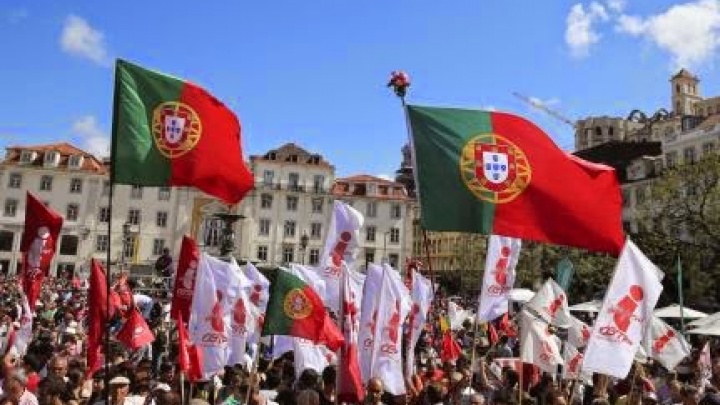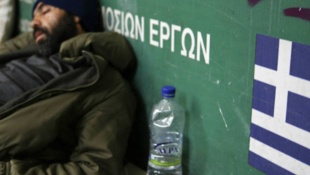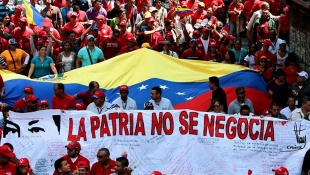February 22, 2016
1. The decisions of the February 18-19 meeting of the European Council clearly show the current level of crisis, breakdown, absence of values and lack of legitimacy of the process of capitalist integration in Europe. This is a crisis that highlights the need and the urgency of breaking with a process of integration that is exhausted and increasingly marked by economic and political policies that represent a social and civilizational regression and by growing attacks against democracy and the sovereignty of the peoples.
2. The negotiations regarding the position of Great Britain in the European Union (the so-called “Brexit”) and the “solution” that was found reveal that, when confronted with a worsening economic and social crisis in Europe and with the contradictions between powers that grow in that context, the leaders of the European Union find no other answer than to, on the one hand, attempt to “accomodate” in a bureaucratic mess the elements of desintegration of the European Union and, on the other, to deepen the reactionary nature of their policies. The decisions that have now been announced belie the much heralded and sanctified “freedoms” of the European Union. The “freedom of movements and circulation” is, after all and as the PCP always said, freedom for big capital and the big monopolies to overcome borders in their policies and in their acts of economic domination, exploitation, extorsion and destruction of the rights and guarantees of the workers in the European Union. This “freedom” has now been reaffirmed and deepened in the negotiating package on “competitiveness”.
The PCP draws attention to the seriousness of the decisions that have been taken within the framework of the negotiation packages on competitiveness, social benefits and the freedom of movements. Their content, as well as the institutional framework that has been found for their implementation – with the envisaged review of EU legislation and even of its Treaties, in what concerns the freedom of movement, social and labour rights – represent a direct attack against the income of workers, namely of migrants, open the road to further social dumping and the withdrawal of social benefits from all workers and, finally, institutionalize in the so-called “union law” the discrimination of workers and citizens according to their nationality and social conditions. This is a reactionary and xenophobic course which destroys all the propaganda regarding a European Union of “freedom”, “cohesion” and “tolerance”. To speak, as the Portuguese government has done, of supposed safeguards and deadlines for implementation, is to try and mitigate what cannot, due to its cruelty and seriousness, be mitigated.
The discussion and the decisions that have now been taken by the institutions of the European Union and by the British Government clearly show that the referendum in Great Britain is seen as an instrument to manage contradictions and to try and whitewash the reactionary nationalist course of the British ruling classes, with the agreement, that has now been confirmed, of the European Union institutions and of the Governments that have a seat in the European Council. The content and the form of the decisions taken confirm that the British referendum has been and will be used to create, with even greater intensity now, an unacceptable web of blackmail and pressure upon the British people, which seeks to condition its sovereign will.
Despite the fact that the process is a farse and of its unacceptable reactionary course which seeks to limit key factors of profound crisis in the process of capitalist integration, the negotiation process shows that it is possible to change and even subvert the European Union Treaties and Legislation, when this is to the benefit of the interests of big finance capital and of the need to overcome contradictions between economic powers and save the supranational mechanisms of political and economic domination – such as the Euro or the mechanisms envisaged in the Banking Union. The “flexibility” which is now on display in the “Brexit” case is in stark contrast with the unacceptable rigidity and inflexibility in relation to the extremely serious social crisis and with the pressure and blackmail that continues to be exerted against countries such as Portugal, as has been all too clear during the debate on the [Portuguese] State Budget for 2016.
Regardless of their nature and contradictions, the decisions that have now been taken put an end to the myth that it is impossible to adapt the status of each Member State to national specificities and to the will of its people, with the possibility of establishing the necessary opt-outs, exceptions or specific safeguards, regarding the common policies, the domestic market, the Treaties – which as has now been proved can be reversed – the pacts and all the other EU legislation.
3. The PCP highlights the adoption by the European Council of recommendations for the Euro Zone, within the scope of the European semester, and stresses that their political guidelines confirm the continuation of a path of destruction of productive systems, divestment, attacks against social and labour rights, concentration and centralization of capital and impoverishment of the masses of the workers and peoples, which makes any strategy to relaunch economic growth impossible.
4. The decisions of the Council regarding migrations clarify, in an explicit and shameless way, the essence of the European Union's migration policy – the closing down of external borders and the expulsion of all those who manage to make it to European Union territory.
The conclusions of the Council not only lend support to the worst practices, which in words are regretted by those responsible for the EU's institutions, as they put forth a militarist and militarized vision and solution for a humanitarian problem. Example of this is the European Council's rejoicing with NATO's intervention, namely in the Aegean Sea, in close collaboration with FRONTEX, and the demand that Turkey takes further measures to prevent the crossings and to contain the migration flows. Such decisions starkly counter international law, which protects and gives rights to refugees and asylum-seekers, and is a harbinger of criminal maritime actions which may result in thousands of deaths. In this context, the PCP expresses its frontal opposition to the Portuguese Government's decision to collaborate with NATO's mission in the Aegean Sea, as well as to the Prime Minister's stated agreement with the creation of the so-called “European Coast Guard”.
The migration policy which is now cold-heartedly reaffirmed and systematized, does not recognize neither rights nor choices for refugees, even for those that ask for asylum, namely through the “blue card”, with which Member-states will exercise their discretionary rights of “hosting” refugees, transforming a legal obligation of humanitarian assistance into a system of selective imports of cheap, skilled labour force, which will give priority to those with higher qualifications.
It is this “solidarity” policy that the EU has to offer for the so-called migration crisis, a humanitarian drama with millions of refugees in North Africa and the Middle East, which nurtures the exodus of hundreds of thousands of people that seek in Europe to escape from hunger, poverty, persecution, war. This storm is a direct result of the EU's policy of interventions, in association with the USA and NATO and their policies of military aggression and interference in various conflicts in those regions, prominent among them the interventions in Libya, Syria, Iraq and Afghanistan. These are criminal neo-colonial policies that seek to destabilize the Arab world in order to ensure the geo-strategic control of those regions.




